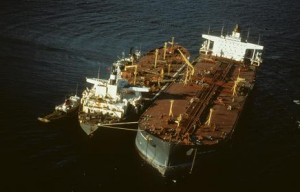
Twenty-six years of litigation over the Exxon Valdez oil spill ended on Thursday, Oct. 15, in a federal district court in downtown Anchorage.
The state and federal governments have decided not to pursue a final $100-million from ExxonMobil over its 1989 oil spill in Prince William Sound.
It was an anticlimactic end. The hearing Thursday morning lasted all of fifteen minutes, and no representative from Exxon spoke.
Instead, Judge H. Russel Holland — who has overseen the Exxon Valdez case from the start — asked the state and federal governments if they had anything to add to their written filing. They said no. So the judge himself spoke.
“I understand that some will be displeased with the government’s decision,” he said, “But based upon what’s in your report, I’m satisfied that it was the right decision.”
“What is clear to me is that the process has been lengthy, it’s been extensive, it’s been expensive,” he said.
Biologist Rick Steiner, who has followed the case since 1989 and pushed the state to seek the additional funds, was outraged by the decision.
“It was extremely disappointing,” he said. “This was a very sad end to a very sad chapter in Alaska history.”
Steiner called it”an unconscionable betrayal of public trust.”
“Above all, it just validates the public’s distrust of the oil industry, and government promises of responsible oil development in Alaska,” he said.
At issue was a provision called a “re-opener” clause. The government’s original 1991 settlement with Exxon, for $900-million, allowed for additional claims in case of unforeseen environmental impacts.
In 2006, the state filed for that money, citing impacts on harlequin ducks and sea otters from oil still lingering under the surface on Alaska beaches.
But now the state and the Department of Justice say those species have recovered — leaving no grounds to go after that money.
Department of Justice attorney Bill Brighton negotiated the 1991 settlement — and, more recently, the proposed settlement over the 2010 BP oil spill. He said the government has made the right call.
“I think we have no lack of aggressiveness toward oil companies, but we also really believe in following what the science tells us,” he said.
And, he said, the science wasn’t there. The government’s claim focused mostly on two species. Other impacts that weren’t included in the 2006 claim — like those on herring or killer whales — couldn’t be considered by the court.
By 2013, the Exxon Valdez Oil Spill Trustee Council had found that harlequin ducks and sea otters had recovered.
“We’ve investigated this claim very thoroughly,” Brighton said. “And we’ve reached the point where it’s clear that further pursuit of the particular narrow claim that was under the re-opener isn’t an appropriate things to do.”
The government’s litigation, over damages to the environment, is separate from the private litigation on behalf of fishermen and local residents.
That ended in 2008, when the Supreme Court approved a $500-million dollar settlement — much lower than the $5-billion a jury originally awarded.
Brighton said, regardless of feelings about the private litigation, the government’s settlement has been a success.
“I understand the feeling of a need for even more retribution,” he said. “And I certainly don’t want to say anything positive about the way the private litigation ended up going. But on the side of the claims of the government, I think we have a very, very favorable and fair resolution.”
The state and feds stressed that while this is the end for litigation, it’s not the end for restoration work in Prince William Sound. The Trustee Council still has $200-million for that work, from the original 1991 settlement.
As for Judge Holland, “My colleagues have been fretting for fourteen years that some of this litigation might outlive my time on this court,” he said. “Happily that hasn’t happened.”
Rachel Waldholz covers energy and the environment for Alaska's Energy Desk, a collaboration between Alaska Public Media, KTOO in Juneau and KUCB in Unalaska. Before coming to Anchorage, she spent two years reporting for Raven Radio in Sitka. Rachel studied documentary production at the UC Berkeley Graduate School of Journalism, and her short film, A Confused War won several awards. Her work has appeared on Morning Edition, All Things Considered, and Marketplace, among other outlets.
rwaldholz (at) alaskapublic (dot) org | 907.550.8432 | About Rachel




